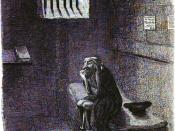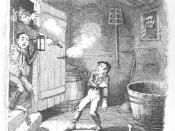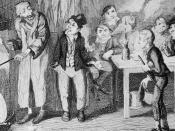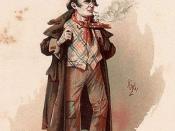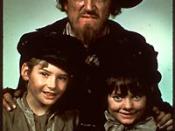Dickens, Charles. Oliver Twist. New York: Signet Classic, 1961.
Oliver Twist. Tony Bill. Richard Dreyfus, Elijah Wood, David O'Hara, Alex Trent, Antoine Byrne. Disney Studios, 1997. 91 minutes. Color.
One of the most important and captivating characters within Oliver Twist is Jack Dawkins, who propels the story forward whenever he is present in a scene. In Tony Bill's version of the film, the portrayal of the Dodger is very different from Charles Dickens original depiction of Jack within the novel. However, both Tony Bill and Dickens present the Dodger as a clever, intelligent thief who has put his wits to the test repeatedly, and survived to become stronger and smarter at every turn. Here once again, the way that the cleverness and intelligence of the Dodger are presented vary strikingly from one medium to the next. Both Charles Dickens book and Tony Bill's movie present the Dodger in different manners, yet in each, the Dodger comes out as a strong, appealing character that people will always remember and understand.
In Dickens's book, the reader first familiarizes himself with Mr. Dawkins a little ways outside of London when he first meets up with Oliver. Dickens gives his description as being
"He was a snub-nosed, flat-browed, common-faced boy . . . and as dirty a juvenile as one would wish to see; . . . he had about him all the airs and manners of a man. . . . [He] was short of his age: with rather bow-legs, and little, sharp, ugly eyes. . . . He was, altogether, as roistering and swaggering a young gentleman as ever stood four feet six, or something less, in the bluchers (83)."
This description paints the Dodger as a dirty delinquent who revels in the art of having fun - whether it be at someone else's expense or his own. Tony Bill, however, presents Jack in a bit of a different light. Here the viewer meets Jack as he stops the pure and morally upright Oliver from stealing some food in a marketplace. In this episode, Tony Bill paints the Dodger to appear as a cocky, laid-back character that stops Oliver from stealing only because it helps him with his own plans. These two different pictures of Jack are a bit similar, but the movie's depiction of the Dodger leaves the viewer caring more about Jack than about Oliver. Dickens portrayal of the Artful, on the other hand, makes the Dodger an entertaining character that does not detract from Oliver himself.
The two different Dodgers also have a different view on their lifestyles. For example, the Dodger in the movie views going to jail as an opportunity with which he might better himself at his chosen trade and then make a grand reentrance onto the London scene. The Dodger in the book, however, has a different outlook on jail - he knows that once he gets sent to jail he is done for and that there will be no hope for him as Fagin says "They know what a clever lad he is; he'll be a lifer. They'll make the Artful nothing less than a lifer (387)." So Jack knowing he will be sent away for life is not willing to go to jail, but rather he is defiant and very cheeky towards the court. His defiance and cheekiness manifests itself within his statement to the court:
"No, not here, for this ain't the shop for justice: besides which, my attorney is a-breakfasting this morning with the Wice President of the House of Commons; but I shall have something to say elsewhere, and so will he, and so will a wery numerous and 'spectable circle of acquaintance as'll make them beaks wish they'd never been born, or that they'd got their footmen to hang 'em up to their own hat-pegs, afore they let 'em come out this morning to try it on upon me (394)."
Both of these representations of Mr. Dawkins catch his attitude towards his destined doom, yet Tony Bill changes his basic attitude of defiance and boldness into an attitude of compliance and submission.
Although Jack's attitudes and feelings differ from that of the book, they fall into place well when taken in view of the entire movie. In the movie, Jack does not know which he should pick - his loyalty for those he loves or his fear of men who are much stronger than he. He also comes across as being very dedicated to not only Oliver and Nancy, but also to his belief of not 'peaching.' His loyalty to Oliver comes through in one of the turning points in the movie. He takes Mr. Brownlow's wallet when Oliver pauses, to protect Oliver from actually committing the crime and receiving the punishment for theft, this was one of the noblest deeds done in the entire movie. Mr. Dawkins did this when he had the possibility of getting away scot-free. Nonetheless, when Jack - faced with the possibility of his own death at Sikes hands if he does not peach on Nancy and what she has been up to - peaches on her, and betrays his belief against 'peaching' along with his loyalty to her, and this ultimately leads to Nancy's death. Therefore, although Jack is a character with strong convictions and loyalties, he still sacrificed Nancy for his own safety.
The two singular depictions of the Dodger also differ in their attitudes towards one of the most controversial characters in this story - Nancy. Dickens's Dodger says not a word to Nancy throughout the novel and only interacts with her once. This interaction takes place when Nancy faints in chapter thirty-nine and the whole gang bands together to help her regain consciousness. In fact, a close reading of this incident shows that Jack was not the one who really cared about Nancy rather it was Charley Bates who seriously felt for Nancy. Dickens shows Charley's care for Nancy during this incident by stating: "These united restoratives, administered with great energy: especially that department consigned to Master Bates, who appeared to consider his share in the proceedings, a piece of unexampled pleasantry (344)." Tony Bill, in his quest to combine different characters, transferred Charley's love for Nancy unto the Dodger's shoulders. However, he also transferred Noah Claypole's greediness and cowardice to the Dodger. This combination of characters, leads to a major conflict within Tony Bill's Dodger and is clearly confusing for the audience. Notwithstanding this major incongruity within the Dodger, Tony Bill does an excellent job of incorporating three distinct personalities and three completely different relationships with Nancy into one believable and lovable character.
Jack Dawkins's portrayals differs greatly from one medium to the next, from the written word to the recorded shot, but each method of presenting the Dodger carries with it a different advantage. Dickens, who created the character, and thus influenced all other presentations of the Dodger, had the advantage of creating multiple characters without consequence. Tony Bill, on the other hand, had the advantage of fusing together different characters to present the Dodger in the way he saw fit. Of course, each rendering of the Artful Dodger also brings with it disadvantages, which the creative mind must overcome in order to manipulate the actual character to its needs. Even though, Tony Bill's Dodger differs in attitude, actions, and characteristics from that of Dickens's original Dodger, they both capture the spirit of smart young boys in the 1900's who were forced to turn to a life of crime for survival in a harsh world that saw them as secondary citizens.
